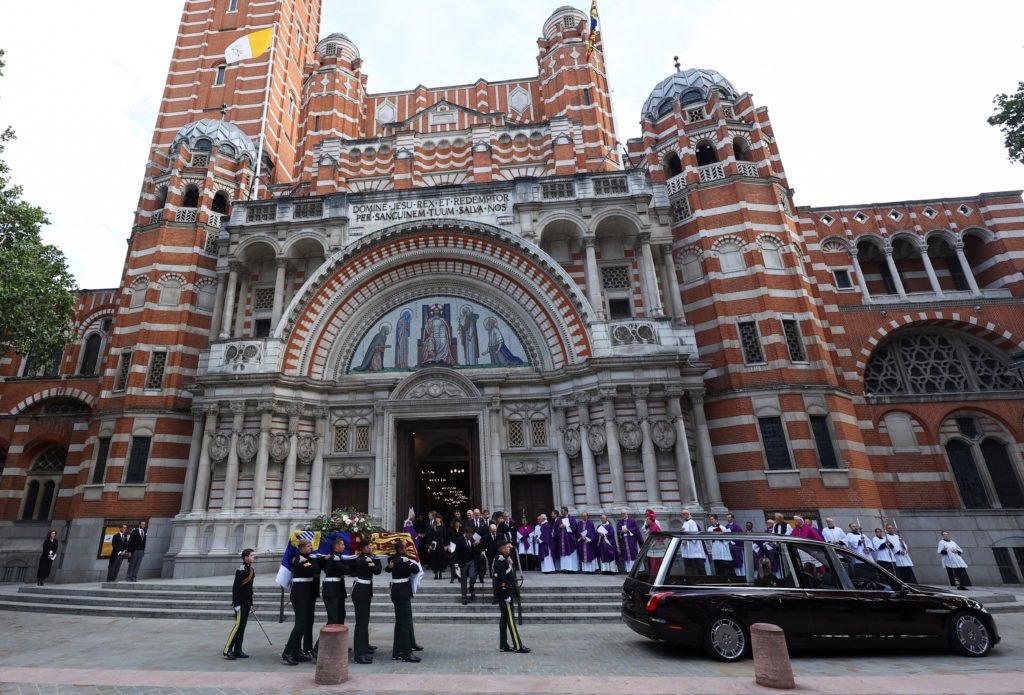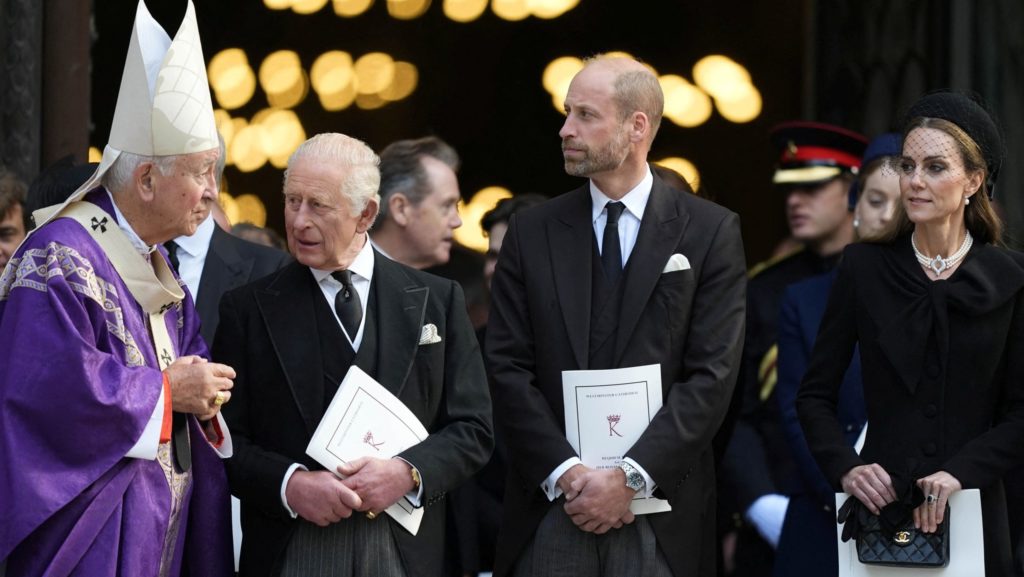British Catholics welcomed the presence of King Charles III and top royals at the Sept. 16 funeral Mass for the Duchess of Kent, a Catholic convert, the first such ceremony in the once-persecuted church's main cathedral.
"This historic event will help renew the link between the monarchy and Catholicism which was broken at the Reformation," said Timothy Guile, chairman of the English Catholic History Association.
"People have watched on TV as the king participated in a Catholic requiem, something once unthinkable, which shows our church is no longer strange or alien."
The Catholic historian was following the funeral for Katharine, Duchess of Kent, in Westminster Cathedral, attended not only by King Charles but the Prince of Wales and dozens of royal family members as well.
Queen Camilla pledged "thoughts and prayers" after being prevented by health problems from attending the Mass, the first royal event in the neo-Byzantine Cathedral of the Most Precious Blood since it opened in 1903.
In an OSV News interview, Guile said it was important the duchess had remained a "fully accepted part of the royal family" after she became a Catholic in 1994, despite continuing tensions over the Catholic Church's historic exclusion.
Meanwhile, another prominent Catholic told OSV News the unprecedented cathedral ceremony would raise the profile of British Catholics, who officially faced criminal sanctions for practicing their faith until the repeal of recusancy laws in 1888.
"While no one can know what the king personally thinks about our church, he's always been sympathetic and conciliatory towards Catholics," said Josephine Siedlecka, editor of the London-based Independent Catholic News agency.
"This first Catholic funeral for a senior royal -- someone who accompanied pilgrims to the Marian sanctuary of Lourdes and was involved in many charitable and pastoral activities – is highly significant."
The duchess, who died at Kensington Palace Sept. 4 at age 92, was born Katharine Lucy Mary Worsley into an Anglican baronet's family in Yorkshire and married Prince Edward, Duke of Kent, first cousin of the late Queen Elizabeth, in 1961.
Her funeral Mass, led by Cardinal Vincent Nichols, chairman of the bishops' conference of England and Wales, included typically Catholic prayers, read by her grandchildren, for the pope and deceased friends and relatives.

In a message, read by the Vatican nuncio, Archbishop Miguel Buendia, Pope Leo pledged "prayerful closeness" to the king and family members, and praised the duchess's "legacy of Christian goodness," evident in "many years of dedication to official duties, patronage of charities, and devoted care for vulnerable people in society."
Meanwhile, in his homily, Auxiliary Bishop James Curry of Westminster praised the duchess's gift for "compassion, empathy, forgiveness and reconciliation," recalling her work as a primary school teacher, as well as with the armed forces, sick children, the homeless and the Samaritans -- a charity aimed at providing emotional support to anyone in emotional distress, struggling to cope or at risk of suicide throughout the United Kingdom and Ireland.
The bishop said the duchess had been "fortified by the Rites of the Church" and lived "a life of dignity, bravery and faith" after being received as a Catholic with the queen's consent by Cardinal Basil Hume.
"Guided by Cardinal Hume and others, Katharine continued a personal spiritual journey that had begun in the Church of England," Bishop Curry said.
"As is true for every human soul, that spiritual journey involved a search for wholeness, healing, inner peace and, ultimately, for God."
Catholics remain barred from royal succession in Britain under a 1701 Act of Settlement, which followed the deposition of James II, the last openly Catholic king, and formalized a constitutional link between the monarchy and the Anglican Church of England.
Two previous kings, James I and Charles I, had foreign-born Catholic consorts, while King Charles II (1630-1685) became a Catholic on his deathbed.
Two granddaughters of Queen Victoria, Princess Victoria (1887-1969) and Princess Beatrice (1884-1966), became Catholics in 1906 and 1913, respectively, after marrying into the Spanish royal family.
However, serving royals in Britain were barred from marrying Catholics until a 2013 Succession to the Crown Act, which also abolished male-preference primogeniture.
Charles III inherited the title of supreme governor of the Church of England and pledged to protect the church's "rights and privileges" and "uphold the Protestant religion" at his May 2023 Westminster Abbey coronation.
However, he attended the 2005 Rome funeral of St. John Paul II and the 2019 canonization of St. John Henry Newman, and he has visited other Catholic landmarks, including London's Farm Street Jesuit center and St. Newman's Oratory of St. Philip Neri, which he toured on Sept. 3.
Other Catholic royals include German-born Princess Michael of Kent and the Duchess of Kent's son Lord Nicholas Windsor, honorary vice president of the Personal Ordinariate of Our Lady of Walsingham and a prominent critic of abortion, who became a Catholic in 2001.
In an OSV News interview, the chairman of Britain's Latin Mass Society, Joseph Shaw, said celebrity converts served as "important witnesses to the faith" and helped attract "attention and prestige" to the Catholic Church.
He added that royal participation in the duchess's cathedral funeral would help "water down" lingering anti-Catholic prejudices and assist the church's "gradual rehabilitation," but also warned that Britain's political establishment remained "resolutely unchristian."
Meanwhile, Guile said the "unprecedented gesture" coincided with an increase in practicing Catholics across Britain and would fuel pressure for a new act of Parliament to separate the monarchy from the Church of England.
"Catholics have made a huge historical contribution here -- they're as patriotically British as anyone else," the Catholic History Association chairman told OSV News.
"People are taking more notice now of our bishops, because of their firm stand on moral and ethical issues, as Catholics help fill a vacuum in the public consciousness," he added.
Britain's Catholic weekly, The Tablet, said the king's first formal attendance at a Catholic Mass in Britain marked "one of the most significant moments in recent Catholic history."

